7 books about Tortorici, Zeb
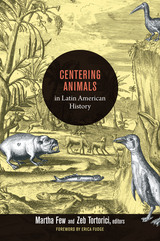
Centering Animals in Latin American History
Martha Few and Zeb Tortorici, eds.
Duke University Press, 2013
Centering Animals in Latin American History writes animals back into the history of colonial and postcolonial Latin America. This collection reveals how interactions between humans and other animals have significantly shaped narratives of Latin American histories and cultures. The contributors work through the methodological implications of centering animals within historical narratives, seeking to include nonhuman animals as social actors in the histories of Mexico, Guatemala, the Dominican Republic, Puerto Rico, Cuba, Chile, Brazil, Peru, and Argentina. The essays discuss topics ranging from canine baptisms, weddings, and funerals in Bourbon Mexico to imported monkeys used in medical experimentation in Puerto Rico. Some contributors examine the role of animals in colonization efforts. Others explore the relationship between animals, medicine, and health. Finally, essays on the postcolonial period focus on the politics of hunting, the commodification of animals and animal parts, the protection of animals and the environment, and political symbolism.
Contributors. Neel Ahuja, Lauren Derby, Regina Horta Duarte, Martha Few, Erica Fudge, León García Garagarza, Reinaldo Funes Monzote, Heather L. McCrea, John Soluri, Zeb Tortorici, Adam Warren, Neil L. Whitehead
[more]
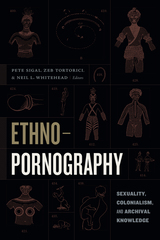
Ethnopornography
Sexuality, Colonialism, and Archival Knowledge
Pete Sigal, Zeb Tortorici, and Neil L. Whitehead, editors
Duke University Press, 2020
This volume's contributors explore the links among sexuality, ethnography, race, and colonial rule through an examination of ethnopornography—the eroticized observation of the Other for supposedly scientific or academic purposes. With topics that span the sixteenth century to the present in Latin America, the United States, Australia, the Middle East, and West Africa, the contributors show how ethnopornography is fundamental to the creation of race and colonialism as well as archival and ethnographic knowledge. Among other topics, they analyze eighteenth-century European travelogues, photography and the sexualization of African and African American women, representations of sodomy throughout the Ottoman empire, racialized representations in a Brazilian gay pornographic magazine, colonial desire in the 2007 pornographic film Gaytanamo, the relationship between sexual desire and ethnographic fieldwork in Africa and Australia, and Franciscan friars' voyeuristic accounts of indigenous people's “sinful” activities. Outlining how in the ethnopornographic encounter the reader or viewer imagines direct contact with the Other from a distance, the contributors trace ethnopornography's role in creating racial categories and its grounding in the relationship between colonialism and the erotic gaze. In so doing, they theorize ethnography as a form of pornography that is both motivated by the desire to render knowable the Other and invested with institutional power.
Contributors. Joseph A. Boone, Pernille Ipsen, Sidra Lawrence, Beatrix McBride, Mireille Miller-Young, Bryan Pitts, Helen Pringle, Pete Sigal, Zeb Tortorici, Neil L. Whitehead
Contributors. Joseph A. Boone, Pernille Ipsen, Sidra Lawrence, Beatrix McBride, Mireille Miller-Young, Bryan Pitts, Helen Pringle, Pete Sigal, Zeb Tortorici, Neil L. Whitehead
[more]
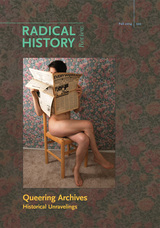
Queering Archives
Historical Unravelings
Daniel Marshall, Kevin P. Murphy, and Zeb Tortorici, special issue editors
Duke University Press
“Queering Archives: Historical Unravelings” is the first of two themed issues from Radical History Review (numbers 120 and 122) that explore the ways in which the notion of the “queer archive” is increasingly crucial for scholars working at the intersection of history, sexuality, and gender. Efforts to record and preserve queer experiences determine how scholars account for the past and provide a framework for understanding contemporary queer life. Essays in these issues consider historical materials from queer archives around the world as well as the recent critical practice of “queering” the archive by looking at historical collections for queer content (and its absence).
This issue explores the evolution of grassroots LGBT archives, debates over queer migrations, nationalism and the institutionalization of LGBT memory, the archiving of transgender activism, digitization and the classificatory systems of the archive, performances of the colonial archive, museums as archives, and everyday objects as archivable texts.
Daniel Marshall is Senior Lecturer in the Faculty of Arts and Education at Deakin University, Melbourne. Kevin P. Murphy is Associate Professor of History at the University of Minnesota and a member of the Radical History Review editorial collective. Zeb Tortorici is Assistant Professor of Spanish and Portuguese Languages and Literatures at New York University.
Contributors: Rustem Ertug Altinay, Anjali Arondekar, Elspeth H. Brown, Elise Chenier, Howard Chiang, Ben Cowan, Ann Cvetkovich, Sara Davidmann, Leah DeVun, Peter Edelberg, Licia Fiol-Matta, Jack Jen Gieseking, Christina Hanhardt, Robb Hernandez, Kwame Holmes, Regina Kunzel, A. J. Lewis, Martin F. Manalansan IV, María Elena Martínez, Michael Jay McClure, Caitlin McKinney, Katherine Mohrman, Joan Nestle, Mimi Thi Nguyen, Tavia Nyong’o, Anthony M. Petro, K. J. Rawson, Barry Reay, Juana María Rodríguez, Don Romesburg, Rebecka Sheffield, Marc Stein, Margaret Stone, Susan Stryker, Robert Summers, Jeanne Vaccaro, Dale Washkansky, Melissa White
This issue explores the evolution of grassroots LGBT archives, debates over queer migrations, nationalism and the institutionalization of LGBT memory, the archiving of transgender activism, digitization and the classificatory systems of the archive, performances of the colonial archive, museums as archives, and everyday objects as archivable texts.
Daniel Marshall is Senior Lecturer in the Faculty of Arts and Education at Deakin University, Melbourne. Kevin P. Murphy is Associate Professor of History at the University of Minnesota and a member of the Radical History Review editorial collective. Zeb Tortorici is Assistant Professor of Spanish and Portuguese Languages and Literatures at New York University.
Contributors: Rustem Ertug Altinay, Anjali Arondekar, Elspeth H. Brown, Elise Chenier, Howard Chiang, Ben Cowan, Ann Cvetkovich, Sara Davidmann, Leah DeVun, Peter Edelberg, Licia Fiol-Matta, Jack Jen Gieseking, Christina Hanhardt, Robb Hernandez, Kwame Holmes, Regina Kunzel, A. J. Lewis, Martin F. Manalansan IV, María Elena Martínez, Michael Jay McClure, Caitlin McKinney, Katherine Mohrman, Joan Nestle, Mimi Thi Nguyen, Tavia Nyong’o, Anthony M. Petro, K. J. Rawson, Barry Reay, Juana María Rodríguez, Don Romesburg, Rebecka Sheffield, Marc Stein, Margaret Stone, Susan Stryker, Robert Summers, Jeanne Vaccaro, Dale Washkansky, Melissa White
[more]
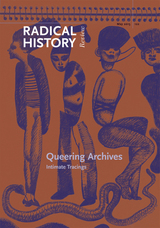
Queering Archives
Intimate Tracings
Daniel Marshall, Kevin P. Murphy, and Zeb Tortorici, special issue editors
Duke University Press
“Queering Archives: Intimate Tracings” is the second of two themed issues from Radical History Review (numbers 120 and 122) that explore the ways in which the notion of the “queer archive” is increasingly crucial for scholars working at the intersection of history, sexuality, and gender. Efforts to record and preserve queer experiences determine how scholars account for the past and provide a framework for understanding contemporary queer life. Essays in these issues consider historical materials from queer archives around the world as well as the recent critical practice of “queering” the archive by looking at historical collections for queer content (and its absence).
This issue considers how archives allow historical traces of sexuality and gender to be sought, identified, recorded, and assembled into accumulations of meaning. Contributors explore conundrums in contemporary queer archival methods, probing some of them in essays on the Catholic Church and the Church of Jesus Christ of Latter-Day Saints. This issue also includes a series of intergenerational interviews reflecting on histories of LGBT archives, a roundtable discussion about legacies of queer studies of the archive, and a closing reflection by Joan Nestle, a founding figure in the practice of international queer archiving.
Daniel Marshall is Senior Lecturer in the Faculty of Arts and Education at Deakin University, Melbourne. Kevin P. Murphy is Associate Professor of History at the University of Minnesota and a member of the Radical History Review editorial collective. Zeb Tortorici is Assistant Professor of Spanish and Portuguese Languages and Literatures at New York University.
Contributors: Rustem Ertug Altinay, Anjali Arondekar, Elspeth H. Brown, Elise Chenier, Howard Chiang, Ben Cowan, Ann Cvetkovich, Sara Davidmann, Leah DeVun, Peter Edelberg, Licia Fiol-Matta, Jack Jen Gieseking, Christina Hanhardt, Robb Hernandez, Kwame Holmes, Regina Kunzel, A. J. Lewis, Martin F. Manalansan IV, María Elena Martínez, Michael Jay McClure, Caitlin McKinney, Katherine Mohrman, Joan Nestle, Mimi Thi Nguyen, Tavia Nyong’o, Anthony M. Petro, K. J. Rawson, Barry Reay, Juana María Rodríguez, Don Romesburg, Rebecka Sheffield, Marc Stein, Margaret Stone, Susan Stryker, Robert Summers, Jeanne Vaccaro, Dale Washkansky, Melissa White
This issue considers how archives allow historical traces of sexuality and gender to be sought, identified, recorded, and assembled into accumulations of meaning. Contributors explore conundrums in contemporary queer archival methods, probing some of them in essays on the Catholic Church and the Church of Jesus Christ of Latter-Day Saints. This issue also includes a series of intergenerational interviews reflecting on histories of LGBT archives, a roundtable discussion about legacies of queer studies of the archive, and a closing reflection by Joan Nestle, a founding figure in the practice of international queer archiving.
Daniel Marshall is Senior Lecturer in the Faculty of Arts and Education at Deakin University, Melbourne. Kevin P. Murphy is Associate Professor of History at the University of Minnesota and a member of the Radical History Review editorial collective. Zeb Tortorici is Assistant Professor of Spanish and Portuguese Languages and Literatures at New York University.
Contributors: Rustem Ertug Altinay, Anjali Arondekar, Elspeth H. Brown, Elise Chenier, Howard Chiang, Ben Cowan, Ann Cvetkovich, Sara Davidmann, Leah DeVun, Peter Edelberg, Licia Fiol-Matta, Jack Jen Gieseking, Christina Hanhardt, Robb Hernandez, Kwame Holmes, Regina Kunzel, A. J. Lewis, Martin F. Manalansan IV, María Elena Martínez, Michael Jay McClure, Caitlin McKinney, Katherine Mohrman, Joan Nestle, Mimi Thi Nguyen, Tavia Nyong’o, Anthony M. Petro, K. J. Rawson, Barry Reay, Juana María Rodríguez, Don Romesburg, Rebecka Sheffield, Marc Stein, Margaret Stone, Susan Stryker, Robert Summers, Jeanne Vaccaro, Dale Washkansky, Melissa White
[more]
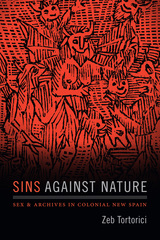
Sins against Nature
Sex and Archives in Colonial New Spain
Zeb Tortorici
Duke University Press, 2018
In Sins against Nature Zeb Tortorici explores the prosecution of sex acts in colonial New Spain (present-day Mexico, Guatemala, the US Southwest, and the Philippines) to examine the multiple ways bodies and desires come to be textually recorded and archived. Drawing on the records from over three hundred criminal and Inquisition cases between 1530 and 1821, Tortorici shows how the secular and ecclesiastical courts deployed the term contra natura—against nature—to try those accused of sodomy, bestiality, masturbation, erotic religious visions, priestly solicitation of sex during confession, and other forms of "unnatural" sex. Archival traces of the visceral reactions of witnesses, the accused, colonial authorities, notaries, translators, and others in these records demonstrate the primacy of affect and its importance to the Spanish documentation and regulation of these sins against nature. In foregrounding the logic that dictated which crimes were recorded and how they are mediated through the colonial archive, Tortorici recasts Iberian Atlantic history through the prism of the unnatural while showing how archives destabilize the bodies, desires, and social categories on which the history of sexuality is based.
[more]
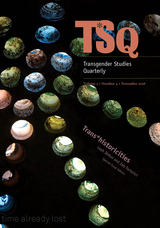
Trans*historicities
Leah DeVun and Zeb Tortorici, special issue editors
Duke University Press, 2018
This issue offers a theoretical and methodological imagining of what constitutes trans* before the advent of the terms that scholars generally look to for the formation of modern conceptions of gender, sex, and sexuality. What might we find if we look for trans* before trans*? While some historians have rejected the category of transgender to speak of experiences before the mid-twentieth century, others have laid claim to those living gender-non-conforming lives before our contemporary era. By using the concept of trans*historicity, this volume draws together trans* studies, historical inquiry, and queer temporality while also emphasizing the historical specificity and variability of gendered systems of embodiment in different time periods. Essay topics include a queer analysis of medieval European saints, discussions of a nineteenth-century Russian religious sect, an exploration of a third gender in early modern Japanese art, a reclamation of Ojibwe and Plains Cree Two-Spirit language, and biopolitical genealogies and filmic representations of transsexuality. The issue also features a roundtable discussion on trans*historicities and an interview with the creators of the 2015 film Deseos. Critiquing both progressive teleologies and the idea of sex or gender as a timeless tradition, this issue articulates our own desires for trans history, trans*historicities, and queerly temporal forms of historical narration.
Contributors. Kadji Amin, M. W. Bychowski, Fernanda Carvajal, Howard Chiang, Leah DeVun, Julian Gill-Peterson, Jack Halberstam, Asato Ikeda, Jacob Lau, Kathleen P. Long, Maya Mikdashi, Robert Mills, Carlos Motta, Marcia Ochoa, Kai Pyle, C. Riley Snorton, Zeb Tortorici, Jennifer Louise Wilson
Contributors. Kadji Amin, M. W. Bychowski, Fernanda Carvajal, Howard Chiang, Leah DeVun, Julian Gill-Peterson, Jack Halberstam, Asato Ikeda, Jacob Lau, Kathleen P. Long, Maya Mikdashi, Robert Mills, Carlos Motta, Marcia Ochoa, Kai Pyle, C. Riley Snorton, Zeb Tortorici, Jennifer Louise Wilson
[more]
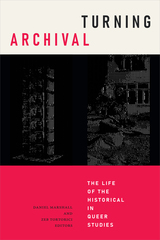
Turning Archival
The Life of the Historical in Queer Studies
Daniel Marshall and Zeb Tortorici, editors
Duke University Press, 2022
The contributors to Turning Archival trace the rise of “the archive” as an object of historical desire and study within queer studies and examine how it fosters historical imagination and knowledge. Highlighting the growing significance of the archival to LGBTQ scholarship, politics, and everyday life, they draw upon accounts of queer archival encounters in institutional, grassroots, and everyday repositories of historical memory. The contributors examine such topics as the everyday life of marginalized queer immigrants in New York City as an archive; secondhand vinyl record collecting and punk bootlegs; the self-archiving practices of grassroots lesbians; and the decolonial potential of absences and gaps in the colonial archives through the life of a suspected hermaphrodite in colonial Guatemala. Engaging with archives from Africa to the Americas to the Arctic, this volume illuminates the allure of the archive, reflects on that which resists archival capture, and outlines the stakes of queer and trans lives in the archival turn.
Contributors. Anjali Arondekar, Kate Clark, Ann Cvetkovich, Carolyn Dinshaw, Kate Eichhorn, Javier Fernández-Galeano, Emmett Harsin Drager, Elliot James, Marget Long, Martin F. Manalansan IV, Daniel Marshall, María Elena Martínez, Joan Nestle, Iván Ramos, David Serlin, Zeb Tortorici
Contributors. Anjali Arondekar, Kate Clark, Ann Cvetkovich, Carolyn Dinshaw, Kate Eichhorn, Javier Fernández-Galeano, Emmett Harsin Drager, Elliot James, Marget Long, Martin F. Manalansan IV, Daniel Marshall, María Elena Martínez, Joan Nestle, Iván Ramos, David Serlin, Zeb Tortorici
[more]
READERS
Browse our collection.
PUBLISHERS
See BiblioVault's publisher services.
STUDENT SERVICES
Files for college accessibility offices.
UChicago Accessibility Resources
home | accessibility | search | about | contact us
BiblioVault ® 2001 - 2024
The University of Chicago Press









